Intel Core i7-11700K Review: Blasting Off with Rocket Lake
by Dr. Ian Cutress on March 5, 2021 4:30 PM EST- Posted in
- CPUs
- Intel
- 14nm
- Xe-LP
- Rocket Lake
- Cypress Cove
- i7-11700K
Gaming Tests: GTA 5
The highly anticipated iteration of the Grand Theft Auto franchise hit the shelves on April 14th 2015, with both AMD and NVIDIA to help optimize the title. At this point GTA V is super old, but still super useful as a benchmark – it is a complicated test with many features that modern titles today still struggle with. With rumors of a GTA 6 on the horizon, I hope Rockstar make that benchmark as easy to use as this one is.
GTA doesn’t provide graphical presets, but opens up the options to users and extends the boundaries by pushing even the hardest systems to the limit using Rockstar’s Advanced Game Engine under DirectX 11. Whether the user is flying high in the mountains with long draw distances or dealing with assorted trash in the city, when cranked up to maximum it creates stunning visuals but hard work for both the CPU and the GPU.
We are using the following settings:
- 720p Low, 1440p Low, 4K Low, 1080p Max
The in-game benchmark consists of five scenarios: four short panning shots with varying lighting and weather effects, and a fifth action sequence that lasts around 90 seconds. We use only the final part of the benchmark, which combines a flight scene in a jet followed by an inner city drive-by through several intersections followed by ramming a tanker that explodes, causing other cars to explode as well. This is a mix of distance rendering followed by a detailed near-rendering action sequence, and the title thankfully spits out frame time data. The benchmark can also be called from the command line, making it very easy to use.
There is one funny caveat with GTA. If the CPU is too slow, or has too few cores, the benchmark loads, but it doesn’t have enough time to put items in the correct position. As a result, for example when running our single core Sandy Bridge system, the jet ends up stuck at the middle of an intersection causing a traffic jam. Unfortunately this means the benchmark never ends, but still amusing.
| AnandTech | Low Resolution Low Quality |
Medium Resolution Low Quality |
High Resolution Low Quality |
Medium Resolution Max Quality |
| Average FPS | 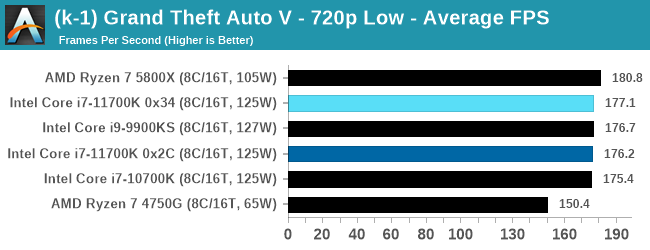 |
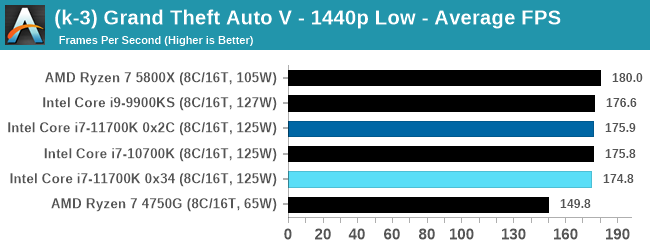 |
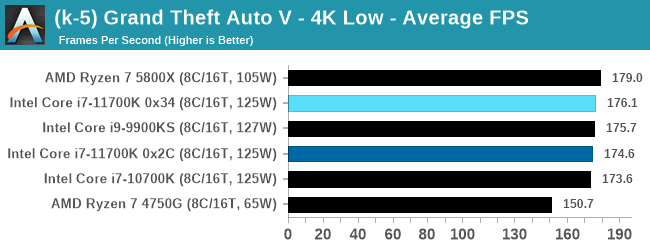 |
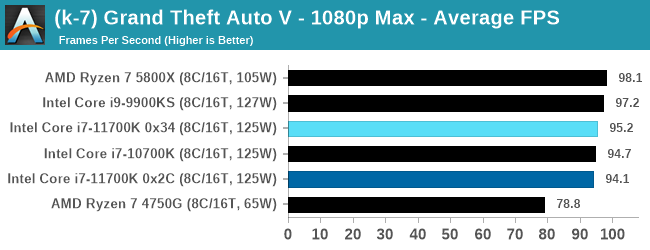 |
| 95th Percentile | 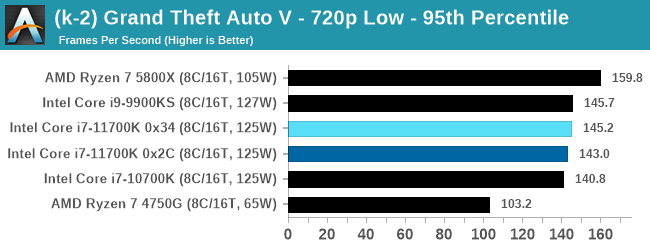 |
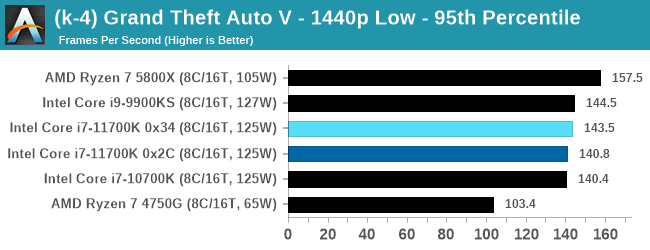 |
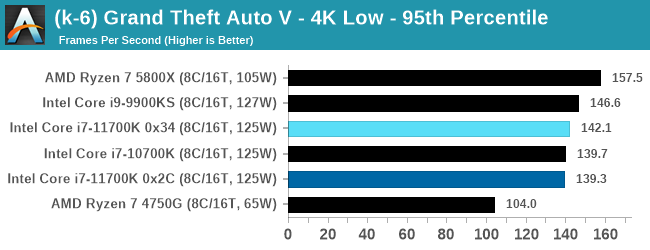 |
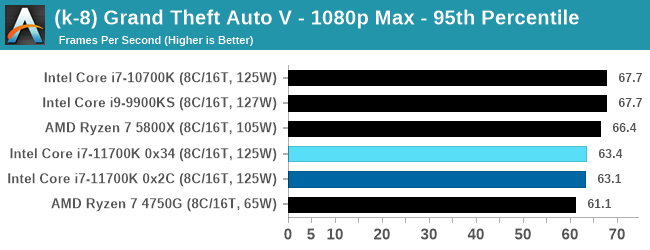 |
All of our benchmark results can also be found in our benchmark engine, Bench.


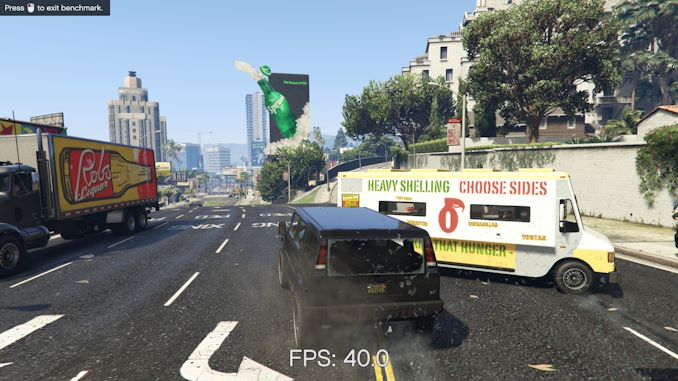









541 Comments
View All Comments
Franseven - Monday, March 8, 2021 - link
I know is a strange request, but i would like to know the iris integrated graphics benchmarks since i'm using my old 2080 ti for mining and i'm playing Minecraft and simple games with my integrated uhd630 of my 9700k, and unfortunately 5900x does not have integrated graphics, so i would like to know 11700k and 11900k perf with that, i have seen mobile benchmarks but as you know, is not the same thing, would like to see quality gaming benchmark as always, from you. thankskmmatney - Monday, March 8, 2021 - link
Would also be interested in this. I sold my 2070 Super - I owned it for a year, and sold it for what I paid (so free card for a year). The idea was to buy a 30X0 card with that money. That didn't happen, so lately I've just been playing Minecraft and older games on an old GTX 460. I'm curious about how the Xe graphics compares - with current prices on Ebay, the graphics along can add about $60 worth of value to the cpu.terroradagio - Monday, March 8, 2021 - link
ASUS just released another BIOS update with Rocket Lake enhancements. Probably more to come closer to the release too. This is why you don't post your review 3 weeks early.Everett F Sargent - Monday, March 8, 2021 - link
Like maybe an AVX-512 down clocking offset? Either Intel released their Rocket Engine a quarter too early or no amount of BIOS tweaking can do what you think it can do, at this, or any, point in time.From this review "Looking at our data, the all-core turbo under AVX-512 is 4.6 GHz, sometimes dipping to 4.5 GHz. Ouch. ... Our temperature graph looks quite drastic. Within a second of running AVX-512 code, we are in the high 90ºC, or in some cases, 100ºC. Our temperatures peak at 104ºC ... "
So already thermal throttling at Intel's promised 4.6 all core frequency using AVX-512. Makes you wonder what it takes to significantly OC this CPU. Which, you know, has barely been mentioned here in the comments section, OC'ing the damn thing, north or south of 300W or ~300W ...
https://i.imgur.com/8BEsGVo.png
terroradagio - Tuesday, March 9, 2021 - link
I guess you missed also the spot where normal AVX used less power than the 9900k. The vast majority don't care about AVX-512. It is just there so Intel can say it is. People who buy Rocket Lake will be interested because of gaming and there will probably be more stock than 7nm products from AMD.Qasar - Tuesday, March 9, 2021 - link
wow. really ? one test ( of a few) where intel was faster, and used less power ? big deal. over all rocket lake, looks to be a joke." People who buy Rocket Lake will be interested because of gaming " wrong, i know a few peope who are not even looking at intel, and are just waiting for zen 3 to be available, and this is for gaming and non gaming usage.
terroradagio - Tuesday, March 9, 2021 - link
I pointed out facts, and you are cherry picking one very selective AVX 512 test. Go away fanboy.Qasar - Tuesday, March 9, 2021 - link
like you your self have been doing ? and showing how much you love intel?hello pot meet kettle.
Everett F Sargent - Tuesday, March 9, 2021 - link
Yes, a 5.0GHz (all core boost clock) at 231.49W for the i9-9900KS versus a 4.6GHz (all core boost clock) at 224.56W for the i7-11700K. Conclusion? The i7-11700K runs 20-25W higher at the same all core boost frequency (4.6-5.0GHz). The i7-11700K wins at test duration though (by a similar margin as the inverse of the power ratio). The CPU energy used is about the same for both.amanpatel - Monday, March 8, 2021 - link
Few questions:1) Why is apple silicon or ARM equivalents not part of the benchmarks?
2) Why are so many CPU benchmarks needed, especially if they don't tell anything significant about them.
3) I'm not a huge gamer, but I also don't understand the point of so many gaming benchmarks for a CPU review.
Perhaps I'm the wrong audience member here, but it does seem a whole lot of charts that roughly say the same thing!